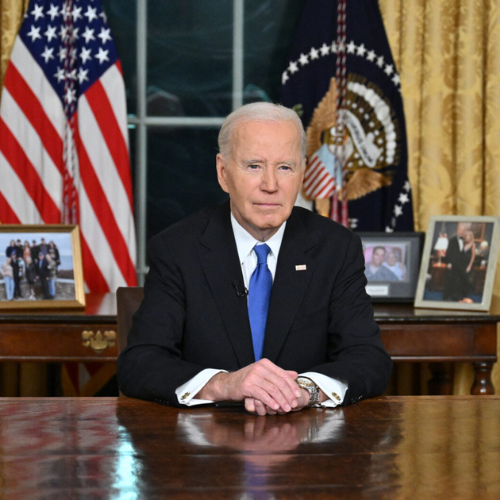The White House has decided to ease some of the sanctions that were imposed on Türkiye in 2019. These sanctions were introduced after Türkiye launched Operation Peace Spring, a military operation in northern Syria aimed at protecting its borders and eliminating terrorist groups. At the time, the U.S. strongly criticized Türkiye’s actions, and as a result, imposed several penalties on Turkish officials, organizations, and businesses.
Now, as President Joe Biden prepares to leave office, he has decided to lift or reduce some of these penalties. The U.S. government explained that this decision was based on “changing circumstances on the ground in Syria.” In other words, the situation in Syria has shifted, and the U.S. felt it was time to reconsider the sanctions. President Biden signed an executive order to amend the previous sanctions, showing that the U.S. is adjusting its policies toward Türkiye.
What Has Changed with the Sanctions?
Before the new decree, Türkiye faced a range of sanctions from the U.S. government. These included measures against specific Turkish officials, government institutions, and businesses. The U.S. had accused Türkiye of actions that disturbed peace in Syria, put civilians at risk, and weakened the fight against terrorist groups such as Daesh (ISIS).
Under the new changes, the U.S. has removed these accusations against Türkiye. Additionally, the sanctions that targeted senior Turkish officials and government institutions have been lifted. Economic penalties against Turkish businesses and industries have been eased, which is a significant development for the country’s economy. Another important change is the lifting of visa restrictions that had been imposed on Turkish officials and organizations affiliated with the Turkish government.
Biden’s Bold Decision to Ease Cuba Sanctions Sparks Controversy
In addition to these changes, the article in the sanctions policy that would have allowed for even more severe penalties against Türkiye has been removed. This means that Türkiye no longer faces the risk of facing additional sanctions in the future related to its actions in Syria. The easing of these sanctions marks a major shift in the relationship between the U.S. and Türkiye.
Why Were the Sanctions Imposed in the First Place?
In October 2019, Türkiye launched Operation Peace Spring in northeastern Syria. The operation aimed to remove terrorist organizations, especially the PKK (Kurdistan Workers’ Party) and its Syrian affiliate, the PYD/YPG, from areas near the Turkish border. These groups were considered a threat to Türkiye’s national security, as they had been involved in terrorist activities that targeted Turkish civilians and soldiers.
Türkiye’s operation was also intended to create a safe zone along its border to allow Syrian refugees to return to their home country. However, the U.S. strongly opposed the operation, arguing that it would endanger civilians and undermine efforts to fight against Daesh (ISIS) in the region. The U.S. also criticized Türkiye’s decision to attack groups that were seen as U.S. allies in the fight against terrorism.
In response, the U.S. imposed sanctions on two Turkish ministries and several senior officials. These sanctions were designed to punish Türkiye for its military actions and to signal disapproval of its operation in Syria. The U.S. government also expressed concern that the operation could lead to further instability in Syria and complicate the ongoing efforts to defeat Daesh.
US Ends Sanctions on Three Indian Organizations, Boosting Clean Energy Ties
At the time, Türkiye strongly condemned the U.S. sanctions, calling them unfair and counterproductive. Turkish officials argued that their country had the right to protect its borders and fight against terrorist groups. They also pointed out that the U.S. and Türkiye were long-time allies within NATO, and the sanctions were seen as damaging to their relationship.
Changing Circumstances in Syria
The situation in Syria has remained complex, with multiple factions fighting for control of the country. Despite the end of Operation Peace Spring, terrorist groups like the PKK and its Syrian affiliates continue to hold important areas in the east of Syria. The region remains unstable, and Türkiye continues to take steps to ensure the security of its southern border.
Given the changing conditions in Syria, the U.S. has now decided to ease some of the sanctions that were imposed on Türkiye. The easing of sanctions signals a shift in U.S. policy, acknowledging that the situation has evolved since 2019. The decision also reflects an understanding of Türkiye’s concerns about its national security and the ongoing threat of terrorism along its border with Syria.
This move is significant for both countries, as it opens the door for improved diplomatic and economic relations between the U.S. and Türkiye. By lifting or reducing some of the penalties, the U.S. has shown that it is willing to adjust its policies based on the changing realities in Syria. For Türkiye, the removal of sanctions is an important step toward rebuilding its relationship with the U.S. and strengthening its position in the region.


